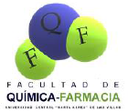Executive Secretary

7th International Symposium of Pharmaceutical Sciences
VII SICF
Abstract
Seaweed has been widely studied in recent years as a natural source of antioxidant compounds for the treatment of different pathologies. In this work, the antioxidant activity of the aqueous extract of the Bryothamnion triquetrum seaweed was studied by means of the reducing power assay (FRAP), its protective effects against the hemolysis induced by AAPH and the determination of the cell viability against the H2O2-induced oxidative stress in the H-125 cell line by using MTT and sulforrodamine. The aqueous extract was able to reduce the ferrous species to ferrous with a dose-dependent response, protect against AAPH-induced hemolysis in sheep erytrocytes and was maintained cell viability above 80% of the total cells at concentrations of seaweed higher than 800 µg / mL. The estimation of the total polyphenol content revealed that this seaweed presents 47.81 ± 2.35 μg EAG / mg of lyophilized extract. The extract methanol: H2O (1:1) present 11 polyphenolic acids, the afzelequina, cumaric and ascorbic acid, which justifies the antioxidant activity reported in this work.
Resumen
Seaweed has been widely studied in recent years as a natural source of antioxidant compounds for the treatment of different pathologies. In this work, the antioxidant activity of the aqueous extract of the Bryothamnion triquetrum seaweed was studied by means of the reducing power assay (FRAP), its protective effects against the hemolysis induced by AAPH and the determination of the cell viability against the H2O2-induced oxidative stress in the H-125 cell line by using MTT and sulforrodamine. The aqueous extract was able to reduce the ferrous species to ferrous with a dose-dependent response, protect against AAPH-induced hemolysis in sheep erytrocytes and was maintained cell viability above 80% of the total cells at concentrations of seaweed higher than 800 µg / mL. The estimation of the total polyphenol content revealed that this seaweed presents 47.81 ± 2.35 μg EAG / mg of lyophilized extract. The extract methanol: H2O (1:1) present 11 polyphenolic acids, the afzelequina, cumaric and ascorbic acid, which justifies the antioxidant activity reported in this work.
About The Speaker

Lic. Jessica Gómez Lemus






